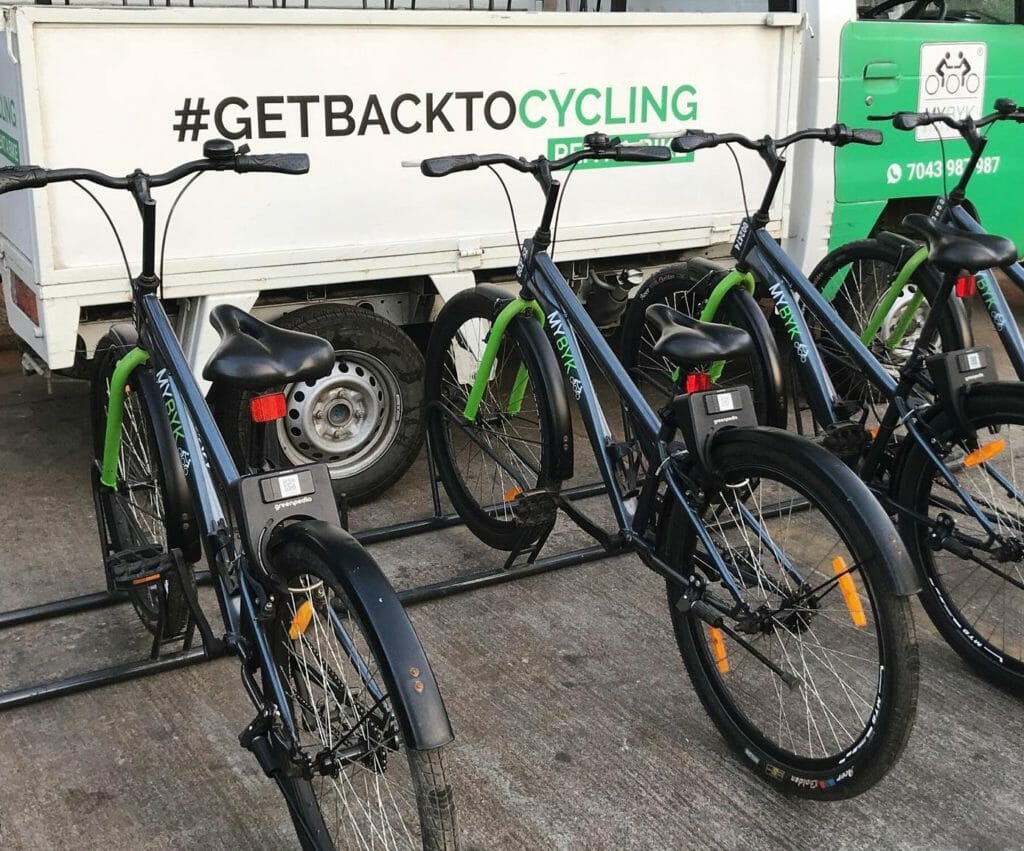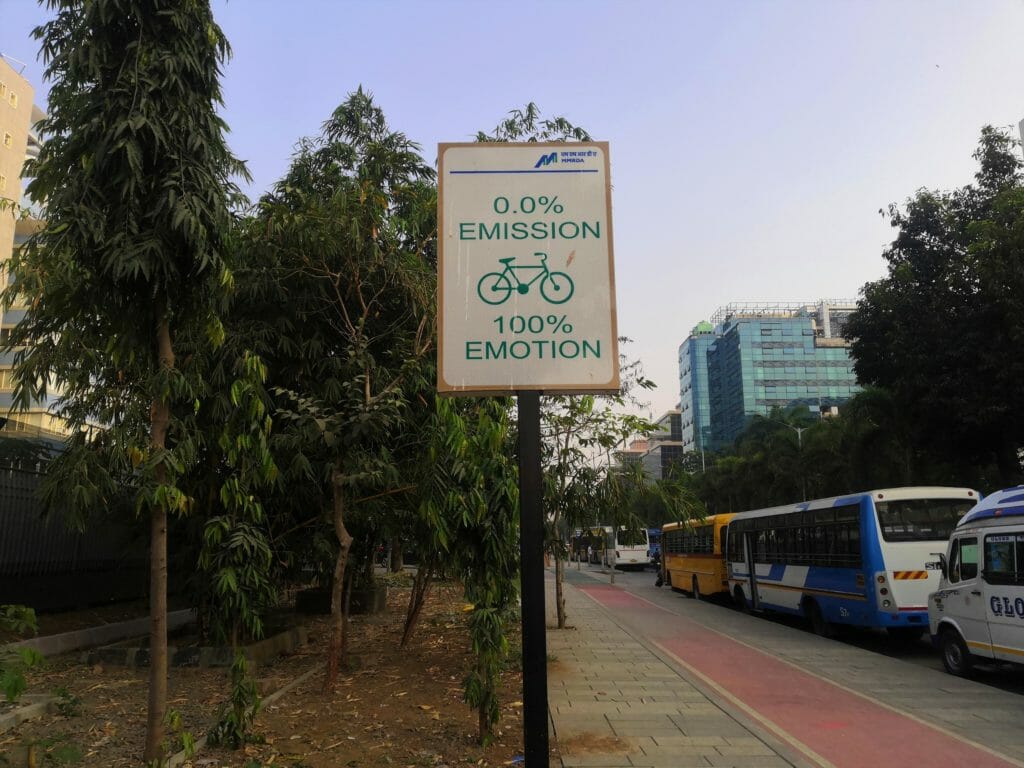Like millions of Mumbaikars, Prashant, a diamond broker, does the first leg of his journey to work by the local train. But on descending at Bandra station, he switches to the Yulu bike, a means of transport available only to those who work at Bandra Kurla Complex (BKC).
Stationed at Anant Kanekar Marg, the powder blue electric bikes are lined up with no apparent lock in place. Named ‘Miracle’, they are lighter and thinner than a scooter, faster than a bicycle. To unlock, one has to download the Yulu bike app and scan the QR code displayed on the stem of the handlebars. The app then kickstarts the bike for you.
The ride to and from the Diamond Exchange, Prashant’s office, takes him 12-15 minutes and costs Rs 20. In both ways, it is comparable to a shared rickshaw. The Yulu bike’s maximum speed of 25 km/hr offsets the time he would have spent in traffic, but it is in the waiting that Prashant saves time. “If you’re here at 6 PM, it’s very hard to find a rickshaw. But these bikes are always there,” he says.
Nearly two lakh people travel to BKC daily, making up 70% of the footfall on Bandra and Kurla station. Launched in August 2020 in partnership with he Mumbai Metropolitan Region Development Authority (MMRDA), the bikes are open to use at all times, without the need for a driver’s license. There are nearly a thousand of them in the Greater Mumbai area, and a majority punctuate the area between BKC, Bandra East, and Kurla Station.
Where is the Yulu bike?
“Mumbai runs on public transport like no other city. With the inclusion of the metro, the system will get another boost,” says Hemant Gupta, co-founder and COO of Yulu. 43% of the population uses the local trains as their main mode of travel, according to the Comprehensive Mobility Plan (CMP) for Greater Mumbai, 2016. These trips are likely to need an additional mode of transport for first and last-mile connectivity (LMC): from home to station, station to work and back.
“The use of polluting LMC modes is likely to offset the environmental and congestion related gains of the public transport system,” write Srishti Gupta and Vignesh P in an article titled ‘The Invisible Last Mile of Mumbai’s Lifeline in the Economic and Political Weekly (EPW). They found that 83% of suburban train commuters use rickshaws, taxis (including app-based) or their own vehicles to head home from stations. Further, 50% of commuters walk for around 1 km–3 km to reach their transport of choice.
Congruently, 35% of vehicular trips in India are short (under 5km). This is where the public bike-sharing (PBS) systems can hit the nail on the head, offering a convenient, cheap, and eco-friendly mode of travel.
“If there are cycling stands near train stations, bus depots, and market areas, people do opt for the app (based) cycles,” says Kaushik Shinde, bicycle mayor of Navi Mumbai. Yulu first launched in the satellite city in 2018 with ‘Move’, a pedal bicycle. Cheaper than the electric ‘Miracle’, they cost Rs 10 for the first 30 minutes and Rs 5 for every half hour after. Over 6000 people use the 1,200 bikes every week, for both commute and fitness.

MYBYK then brought shared pedal cycles to Mumbai at Jagruti Nagar Metro station in 2019. The Ahmedabad-based company won a grant under the Station Access and Mobility Program (STAMP) – launched by MMRDA. However, it has been slow to expand to other stations on the line. Instead, they’ve found small success among housing societies in Oshiwara in Andheri, who forgo government permissions by opting for private docks. At Rs 2 per hour, these are cheaper than the cheapest public transport (Rs 5 is minimum for buses and trains).
Bike Sharing picking up, thanks to Q-commerce
In the last few months, Chartered Bikes, another PBS firm, has set up its first electric bike stations in Powai. They plan to scale up to 2,000 bikes and 200 charging stations in the coming 6 months.
Yulu’s expansion has crept into Bandra West, and suggests an eventual surpassing of their bikes in other cities. It also intends to introduce ‘Express’, an electric scooter with a maximum speed of 45 km/hr. 500 planned battery swapping ‘Yulu Max’ stations will do away with any anxiety of the bikes running out of charge.
In partnership with Mumbai’s primary energy provider Adani Electricity, both the companies are looking to bring in a new customer: delivery workers. “Because of COVID-19, home delivery has become so common. There suddenly is an explosion of people saying ‘Why should I go out if I can order in with a few clicks on my phone?’,” says Hemant. “Which product is better than the Yulu bikes to do that quick and in an eco-friendly way?”
This has coincided with the rise in ‘quick commerce’, wherein delivery is promised in 10-30 minutes. Companies, notably Swiggy’s Instamart and Blinkit (previously Grofers), do this by expanding their storage network of dark stores (e-commerce micro-fulfillment centres). Delivery workers thus have to travel shorter distances, increasing the practicality of cycles and e-bikes.
Read more: Mumbai needs more BEST buses
In line with this move, both the firms are offering longer-term rentals, starting at Rs 200 per day. According to Hemant, this reduces the rider’s expenditure by 35%, accounting for the cost of the bike, fuel, and maintenance. Tie-ups with delivery companies, who are also inclined to include e-vehicles in their fleets, have the potential to sweeten the deal.
In 2021, Yulu bike estimated 17,000 gig workers across the country used their bikes. Goods delivery in Bandra West already makes up 35% of their business in Mumbai.
“My recommendation to delivery companies is that they give more incentives to those who deliver on cycles than fossil fuel-run scooters. The commission structure is exactly the opposite right now,” says Kaushik Shinde.

Increasing bike sharing systems
Compared to PBS systems in other cities in the country, Mumbai lags behind. However, this is not due to any lack in opportunity.
The earliest bicycle-sharing systems in the country launched in Mumbai in 2009. The first was Thane’s FreMo, short for ‘freedom of movement’. The other was Cycle Chalao, started by Raj Janagam and Jui Gangan, two students of Narsee Monjee Institute of Management Studies in Vile Parle. Students were its primary customers, using it between the station and college in Mulund.
Instead of giving the city a head start, lack of government support brought them to a spluttering stop.
Cycle Chalao folded in 2012, despite a Rs 20 lakh investment. FreMo was likewise refused space for docking stations, so they operated out of rented shops, eventually folding in 2017.
It now seems the Brihanmumbai Municipal Corporation (BMC) is making an effort to rectify its past actions. It released a PBS policy in December 2020, incentivising companies with free parking (at designated spots) and increased revenue opportunities. Unlike old manual systems, mobile apps are mandated to automate check-in and check-out.
“Because people are loving the bikes, we have had a very good response from the MCGM,” says Hemant Gupta.
Companies proposed some changes, including reducing the minimum annual turnover to 30 lakhs and the starting inventory of bikes from 5000 to 1000. The policy is currently awaiting approval from the Improvement Committee and is expected to be cleared this week, according to an official in the BMC’s Roads and Traffic department. After clearance, ward officers will be responsible for implementation.
Two companies have already sent their applications in for A, H West, and L ward, among others. The target for the first phase is 1 lakh bikes.